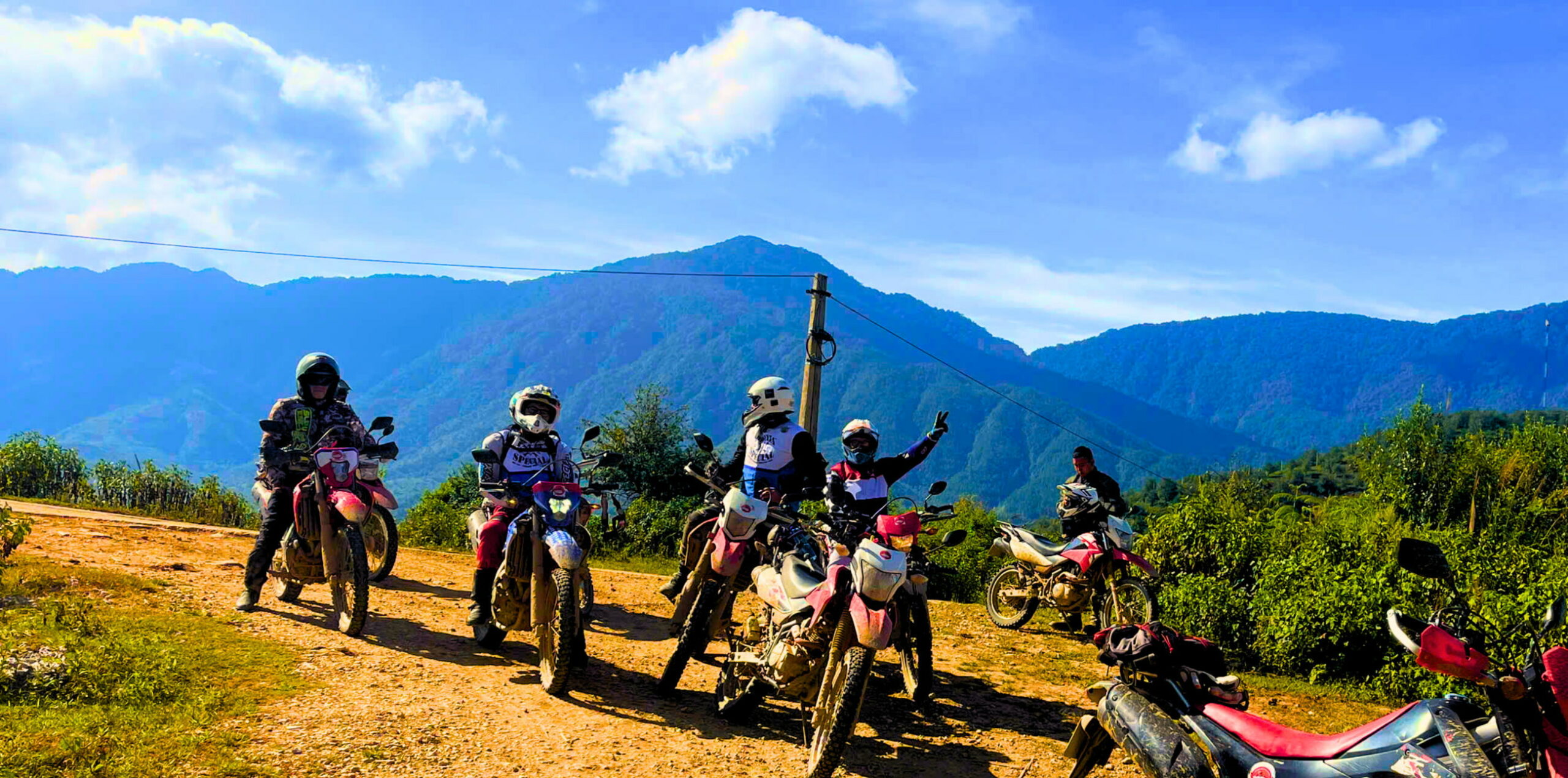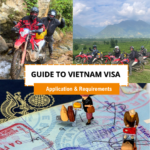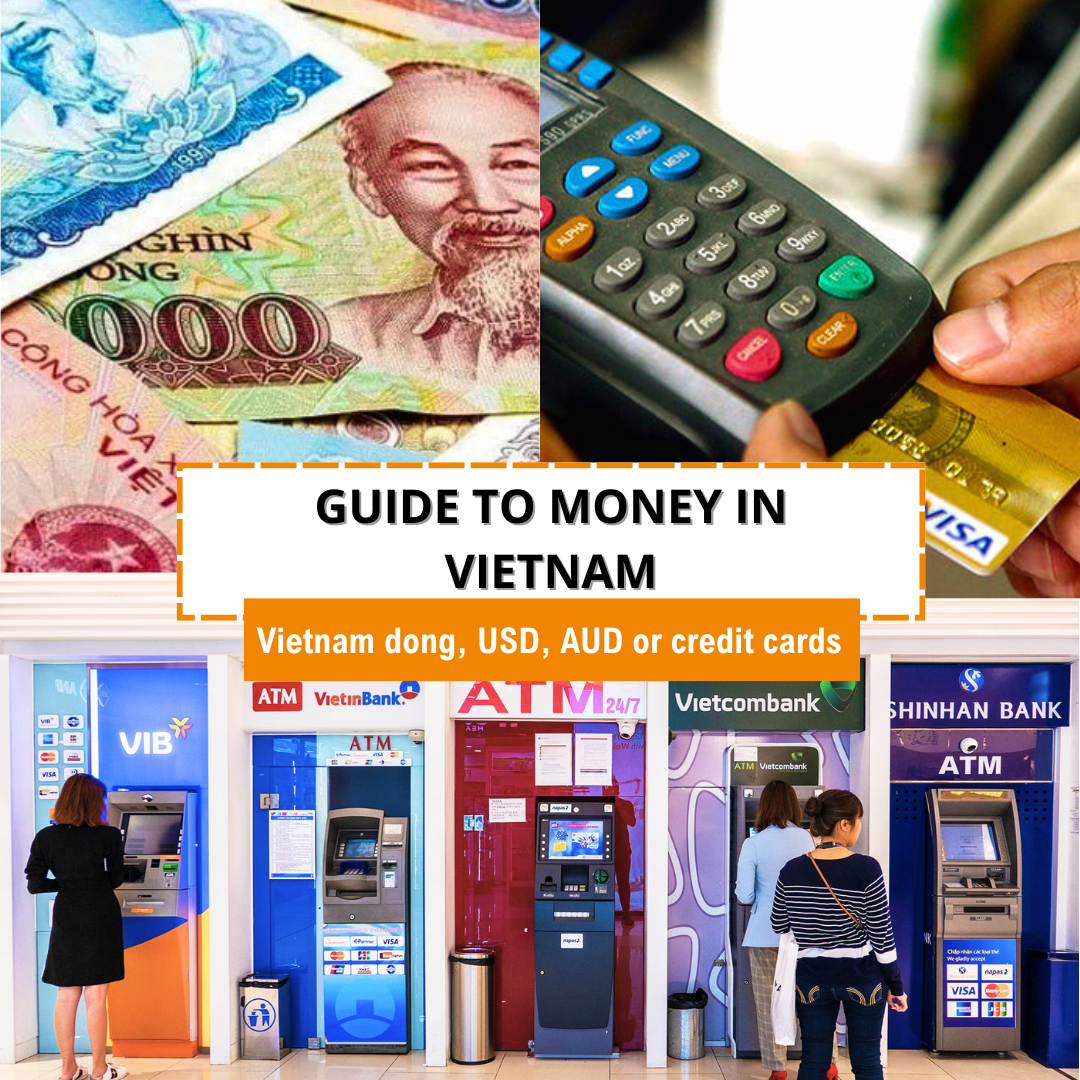
A Comprehensive Guide to Money in Vietnam 2024
Are you ready to embark on an unforgettable motorbike adventure through the stunning landscapes of Vietnam? Before you hit the road, it’s crucial to grasp the financial aspects of your trip. This comprehensive guide to money in Vietnam will equip you with all the necessary information about money in Vietnam, from currency exchange to budgeting and tipping.
Vietnam currency
The Vietnamese dong (₫ or VND) is the official currency. It’s issued in banknotes of various denominations, ranging from small paper bills to larger polymer bills, in values from 10,000 VND to 500,000 VND. To simplify calculations, mentally remove three zeros to get a simpler number. For a quick conversion from VND to USD, divide by 25. Notably, coins are not used in the Vietnamese currency system.
Additionally, Vietnamese banknotes are produced on cotton or polymer paper in various colors and sizes for easy identification. Specifically:
Cotton banknotes
- 1,000 VND
- 2,000 VND
- 5,000 VND
Tips: While small denominations might seem insignificant individually, they quickly add up during everyday purchases. These smaller notes are crucial for buying items like bottled water, iced green tea, or snacks from street vendors, or paying parking fees for your motorbike.
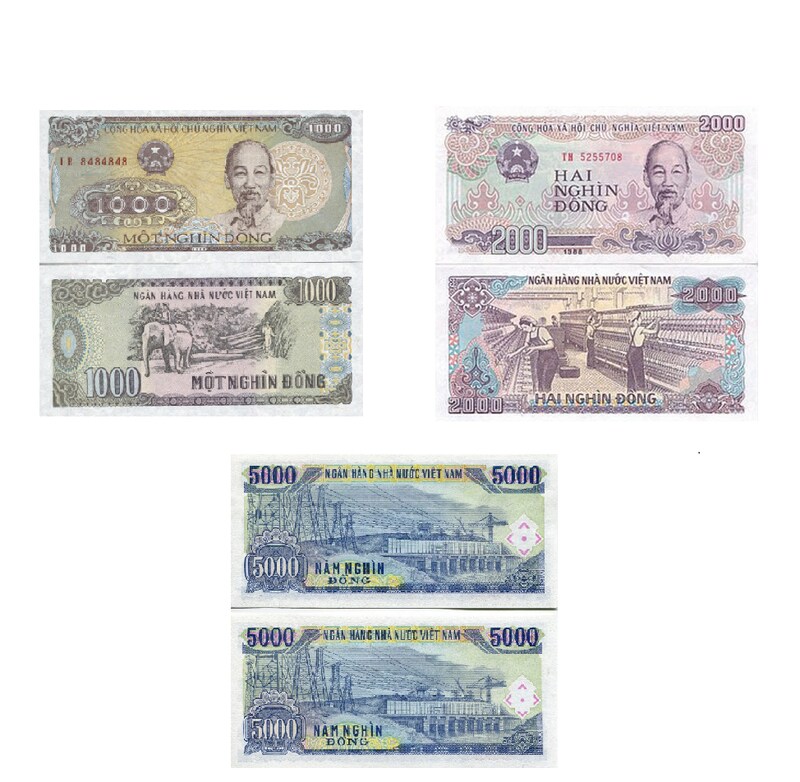
Polymer banknotes
Different notes of Vietnam currency bear different pictures of popular tourist destinations. Japanese Bridge (Hoian) on 20.000 VND, Nghenh Luong Temple (Hue) on VND50,000. Temple of Literature (Hanoi) on 100,000 VND. Ha Long bay on 200,000 VND. Lotus Village (Nghe An) on 500,000 VND.
- 10,000 VND
- 20,000 VND
- 50,000 VND
- 100,000 VND
- 200,000 VND
- 500,000 VND
Tips:
- The 500,000 VND note, Vietnam’s highest denomination, is a dark green color that can be easily confused with the 20,000 VND bill. While useful for large payments, it may not be accepted for small purchases due to a lack of change. For daily transactions, carrying smaller denominations is recommended.
- It can be overwhelming to see so many zeros on Vietnam currency. There is a locals’ trick, though: Prices are frequently denoted by a “K” to stand for a thousand. For instance, 10,000 dong is equal to 10,000k.
- Also, prices are simply stated as 100, 200, or 500, which represent 100,000 dong, 200,000 dong, or 500,000 dong, respectively. Don’t be misled by the lower-value 100 VND, 200 VND, or 500 VND banknotes, which are no longer in circulation.
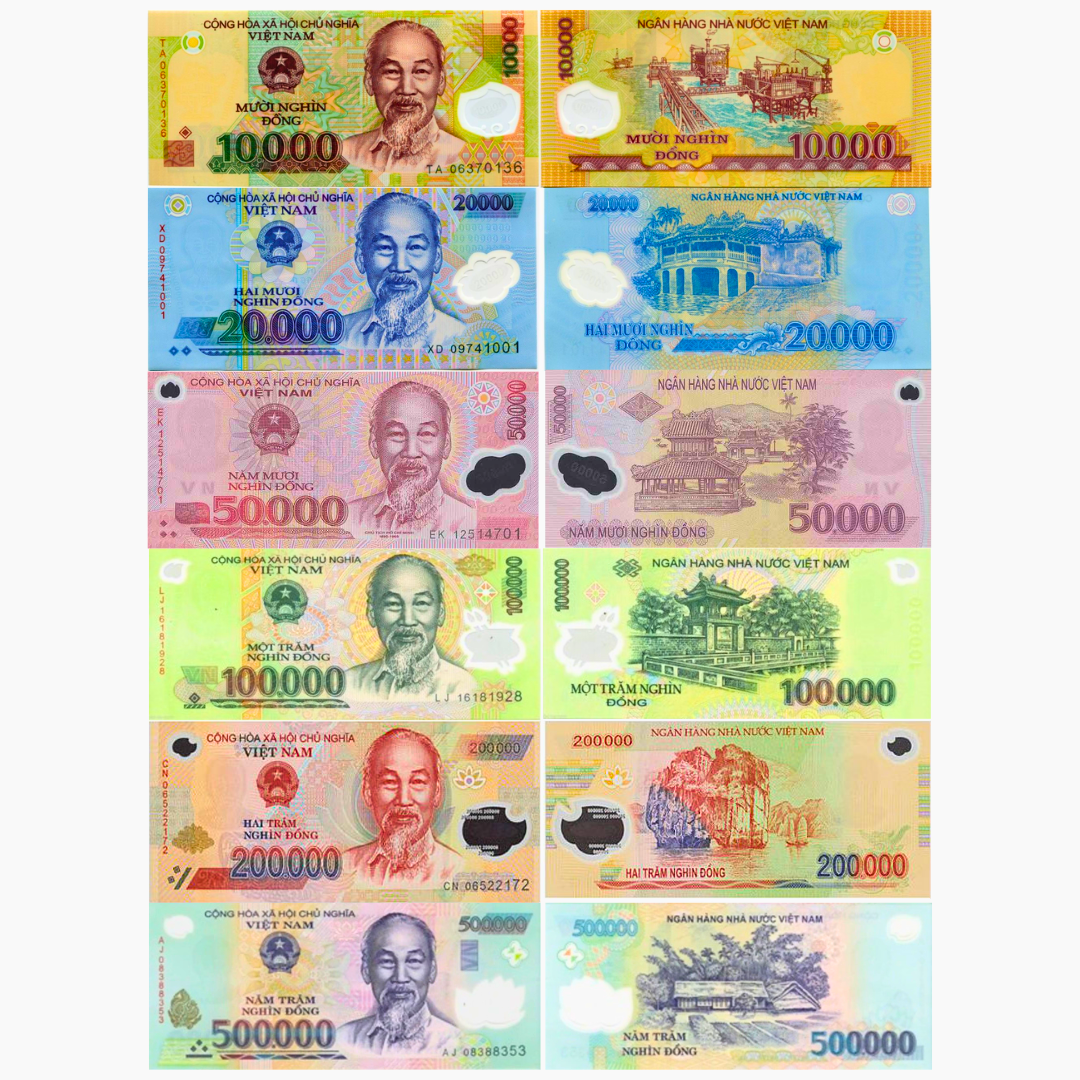
Vietnam dong, USD, AUD or credit cards – How to pay for purchases in Vietnam?
Once you understand Vietnam currency, you may wonder about payment methods. Should you pay by card or cash? Are foreign credit cards accepted in Vietnam? What are the bank charges?
Cash
Upon arriving in Vietnam, it’s essential to have some local currency on hand. Cash remains king, especially in markets, small eateries, and rural areas.
For your North Vietnam motorbike adventure, especially when exploring remote regions like Ha Giang, Lao Cai, and Yen Bai, it’s advisable to withdraw extra cash. This will ensure you have enough to purchase local souvenirs, or other items directly from local artisans.
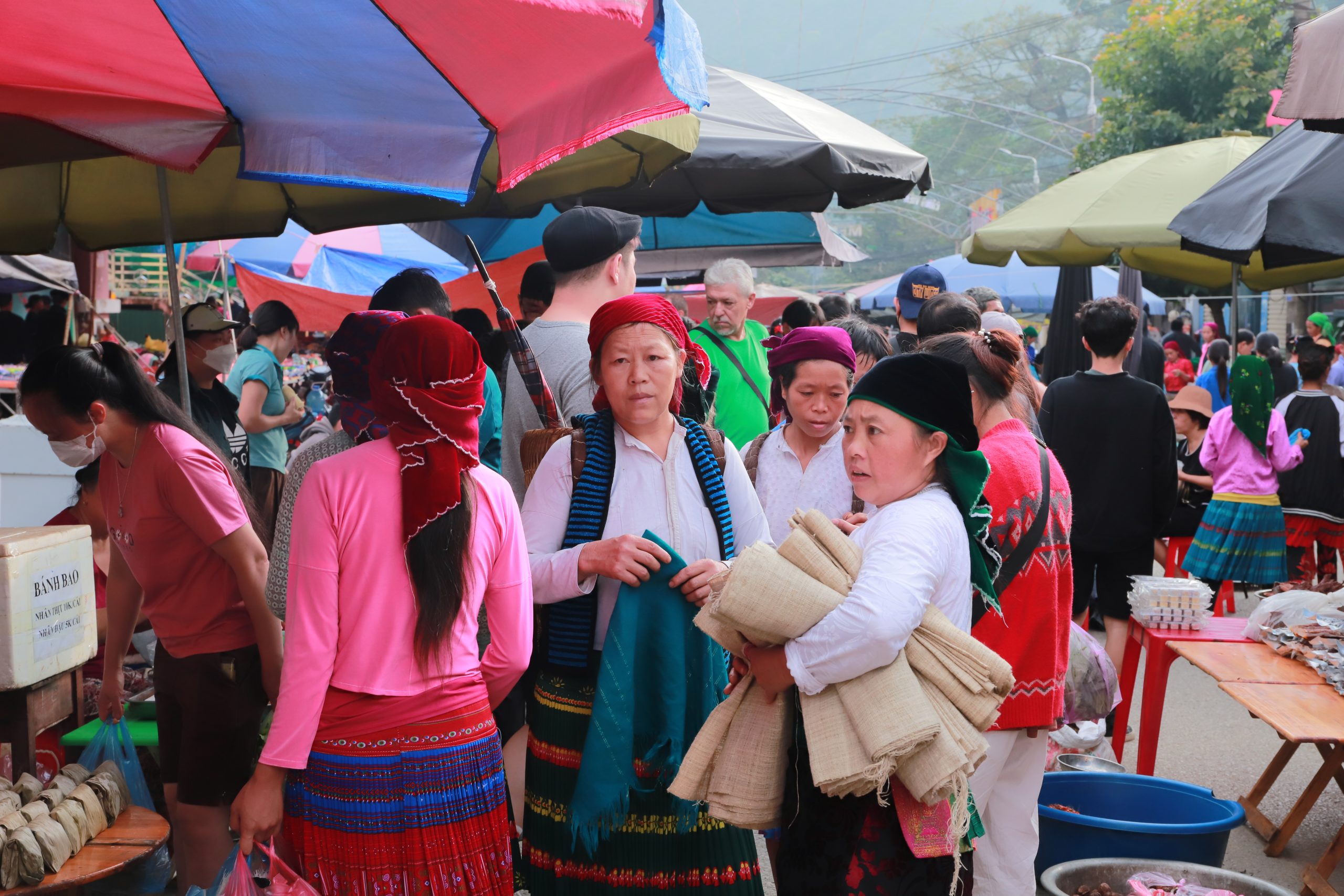
USD (The United State Dollar)
The United States Dollar (USD) is widely accepted in Vietnam, making it a convenient currency for many riders. As of October 2024, one USD is approximately equivalent to 25,385 VND.
While many hotels and larger businesses accept USD, smaller vendors and street markets may prefer Vietnam currency. Carrying a mix of both currencies will ensure a smooth travel experience.
Should you pay in USD when given the option? While possible, it’s generally more advantageous to use Vietnam currency. The exchange rate offered by vendors may not be favorable to you. Paying in VND can often result in a better deal.
AUD (The Australian Dollar)
While Australian dollars (AUD) aren’t widely accepted in Vietnam, you can exchange them at authorized exchange offices and banks. As of October 2024, one AUD is approximately equivalent to 16,964 VND.
For better exchange rates, consider exchanging larger denominations. By being mindful of currency exchange, you can fully immerse yourself in the culture and enjoy all that Vietnam has to offer.
Credit cards and bank free
While cash is still widely used for small purchases and street vendors, major credit cards are accepted at many establishments throughout Vietnam. Hotels, tour operators, boutiques, upscale restaurants, large supermarkets, and some spas generally accept international credit cards. Using credit cards can help you reduce the need to carry and convert large sums of cash while traveling.
When using a bank card abroad, be aware of potential foreign transaction fees, typically ranging from 3-4%. Contact your bank before your trip to inquire about these fees and any necessary precautions. Some merchants may add a minimum surcharge of 3% onto the purchase price in addition with the bank fee for international transaction.
If you want to pay by credit card, we recommend that you only do it for your larger travel expenses, on the spot or online in advance: pricier hotels, some pricier excursions, flight tickets, and huge purchases such as jewelry or designer clothing.
Inform your bank of your travel dates to Vietnam to ensure they are prepared for your international transactions.
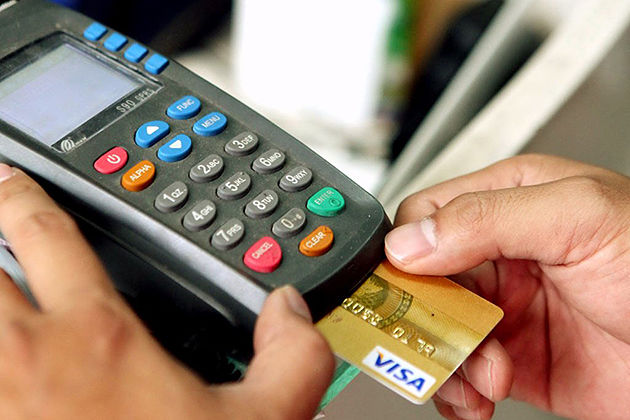
How to exchange money to Vietnam currency?
Exchanging currency in Vietnam can be a bit confusing, but here’s a helpful tip: You’ll generally get better exchange rates in Vietnam compared to exchanging currency in your home country.
Common currencies like the Euro, US Dollar, British Pound, and Australian Dollar can be easily exchanged at various locations throughout Vietnam.
Check our guide to money in Vietnam for some tips for a smooth currency exchange experience:
- Currency exchange desks at international airports just before the exit gates: Vietnam currency exchange booths are a common option found at most airports throughout Vietnam. These booths are usually open 24/7, making them a convenient choice for travelers arriving late at night or early in the morning.
- Banks (including credit unions): While banks typically offer the best exchange rates for Vietnam currency, the process may take longer and require additional documentation, such as a passport or visa. It can be hassle when you want to do a quick exchange and go.
Additionally, some banks only exchange Vietnam currency during specific hours, so it’s a good idea to check in advance before heading to the bank. The advantages of exchanging money at banks include a high level of security and minimizing the risk of fraud or receiving counterfeit money.
- Gold and Jewelry stores: In Vietnam, gold and jewelry shops often offer money exchange services and provide some of the best exchange rates, especially the stores in the Old Quarter of Hanoi (along Hang Bo and Ha Trung street) or those behind Ben Thanh market in Ho Chi Minh City. Although the process is quick without passport and visa requirement, they are technically illegal. It’s important to carefully check any fees associated with the transaction before exchanging your Vietnam currency.
- Some hotels: You can also exchange currency in large reputable hotels, which will take no time. Still, the hotels may charge a service fee and the exchange rate can be less favourable.
Which ATMs to use in Vietnam?
You can find ATMs accepting international cards just outside the arrival gates at all major airports. ATMs are a common sight in Vietnamese cities, and you should have no trouble locating one in most destinations. In rural areas, ATMs are less common.
International cards such as Visa, Master Card, Union and JCB are commonly accepted at more than 20,000 ATMs nationwide. If you need help finding the nearest ATM, just ask your hotel since not all ATMs are listed on Google Maps.
Withdrawal limits per transaction range between 2 million VND (just under 100 dollars) and 3 million VND with local bank ATMs like TP Bank, VietinBank, VietcomBank, SacomBank, VP Bank, MB Bank; and between 5 million VND to 10 million VND with international bank ATMs like ANZ, Citibank and HSBC.
Please note that, these limits are not guaranteed as different ATMs of the same bank can have different withdrawal limits.
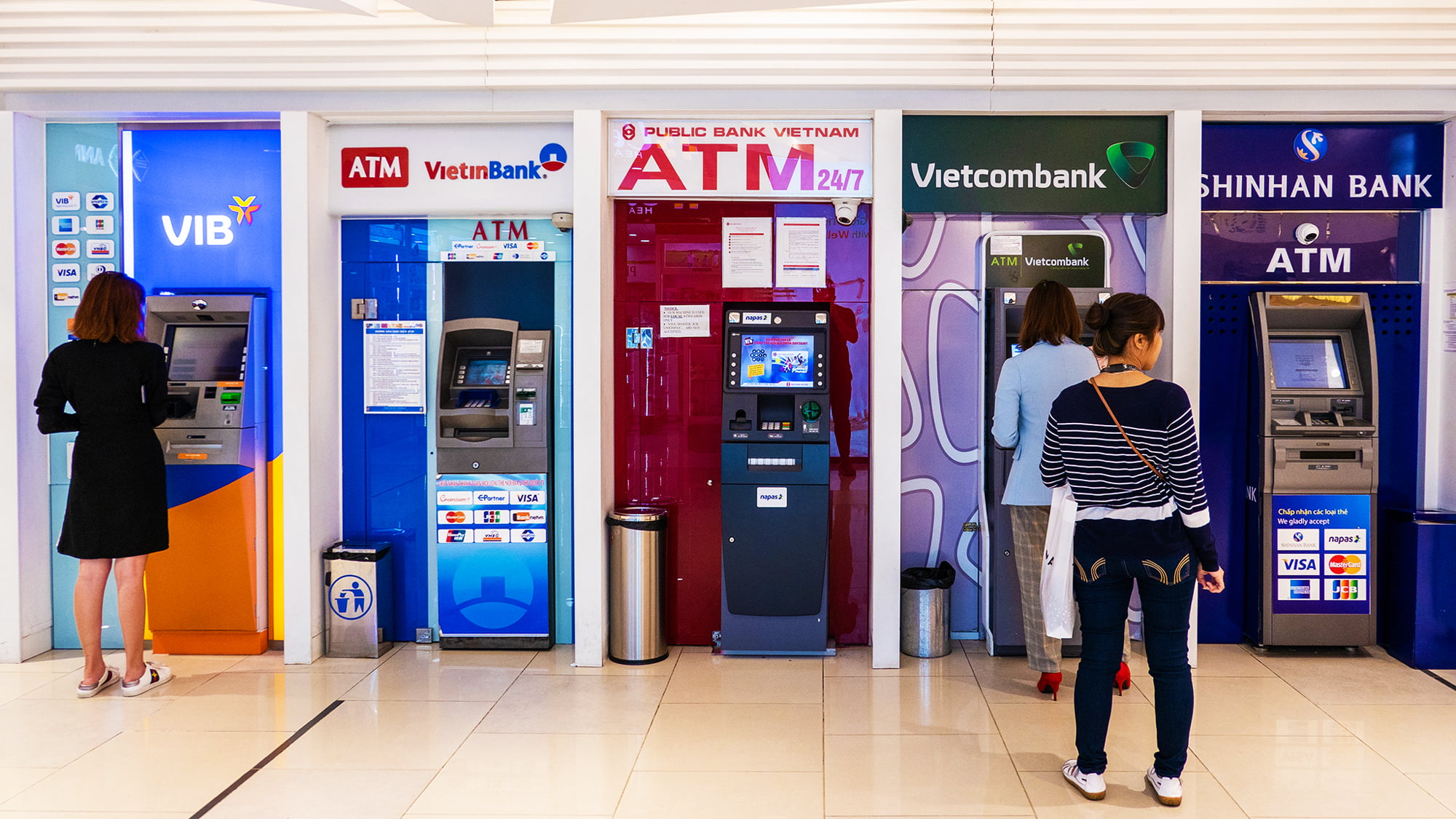
Be aware that there is an ATM fee for each withdrawal. This fee again varies from bank to bank, but it usually somewhere between 20,000 and 55,000 per transaction. If the ATM asks for more its best to keep walking.
Additionally, if using a bank card abroad, there are usually bank fees for all foreign transactions. These charge will vary from bank to bank, but you could be looking at a fee of between 3 and 4% extra per transaction. This might not sound like a lot, but it quickly adds up if you are restricted to withdrawals of round 2 million VND each time.
How much do things cost in Vietnam?
Wondering how much money to set aside for your trip to Vietnam?
If you’re on a budget, eating street food and staying in homestays is a great way to go, and will still give you an enriching experience of Vietnam. If you’ve got a little more to spend, Vietnam’s mid-range hotels and local restaurants offer wonderful value and heartfelt service. And if you’re here to indulge, our five-star properties and private tours offer superb quality and unforgettable moments.
See the list below for some average prices:
- Water Bottle – 10,000 VND (0,39 USD)
- Sidewalk coffee– 25,000 VND (1 USD)
- Bowl of Pho– from 45,000 VND (2 USD)
- Cappuccino in a cafe– 55,000 VND (2.2 USD)
- Three-course restaurant meal– 450,000 (18 USD)/person
- Inner city taxi (1 km)– 15,000 VND (0,59 USD)
- 60-minute foot massage at local spa– 350,000 VND (15 USD)
- Budget hostel– 300,000 VND (12 USD)/night
- Mid-range hotel– 700,000 VND (30 USD)/night
- Half-day group tour– 1 million VND (43 USD)
- Luxury hotel– 3.5 million VND (150 USD)/night
How much money should I budget per day?
Vietnam is among the cheapest tourist destinations in Southeast Asia, with an average cost of between $20 and $100 USD per day depending on your travel preferences. Below is a list of common expenses:
- Budget Traveler: $20–$30 each day covers sleeping in hostels or inexpensive guesthouses, eating from the streets and local transport means.
- Mid-range Traveler: $50–$100 each day for more comfortable accommodations; dining at restaurants that belong to the midrange category; and some sightseeing packages.
- Luxury Traveler: $150 and up every day for accommodation in high-end hotels, fine dining experiences as well as personalized tours.
Is tipping expected in Vietnam?
Tipping is not a customary practice in Vietnam, but it’s becoming more common in certain situations. While not expected, tipping is always appreciated in massage, café, private tour guide, etc.
However, a small service charge may be included in your bill at high-end restaurant. If you are in a low-scale dining establishments, tipping can seem strange.
Bargaining is common in casual shopping areas and markets in Vietnam. If you’re in a touristy area, you can often negotiate for a lower price. Browse around and compare prices at different shops before making a purchase.
Safety and security
Vietnam is a safe destination for travelers, but it’s always wise to exercise caution with your finances. Here are some helpful tips for managing money in Vietnam. By taking these precautions, you can travel with greater peace of mind.
- Petty thefts: To avoid drawing attention to valuables while in public, utilize the hotel safe in your room for storage. Keep phones, cameras and wallets close to your person, especially in crowded areas. Consider using cards with advanced security features like Visa’s 3D security system to minimize the risk of loss or fraud.
- ATMs: Check if your card is compatible with local ATMs before traveling to Vietnam.
- Scam alert: Be careful of street vendors and local markets using similar colors of 500,000 VND and 20,000 VND bills to scam travelers.
- Counterfeit money: There are some counterfeit banknotes in circulation in Vietnam, particularly for the 500,000 VND, the biggest Vietnam currency note, so you should only exchange money at reputable places.
- Keep small bills on hand: Many vendors and small businesses may not have change for larger denominations, so it’s helpful to keep smaller bills on hand.
- Notify your bank: If you plan to use your credit or debit card in Vietnam, notify your bank beforehand to avoid any issues with your account being flagged for suspicious activity.
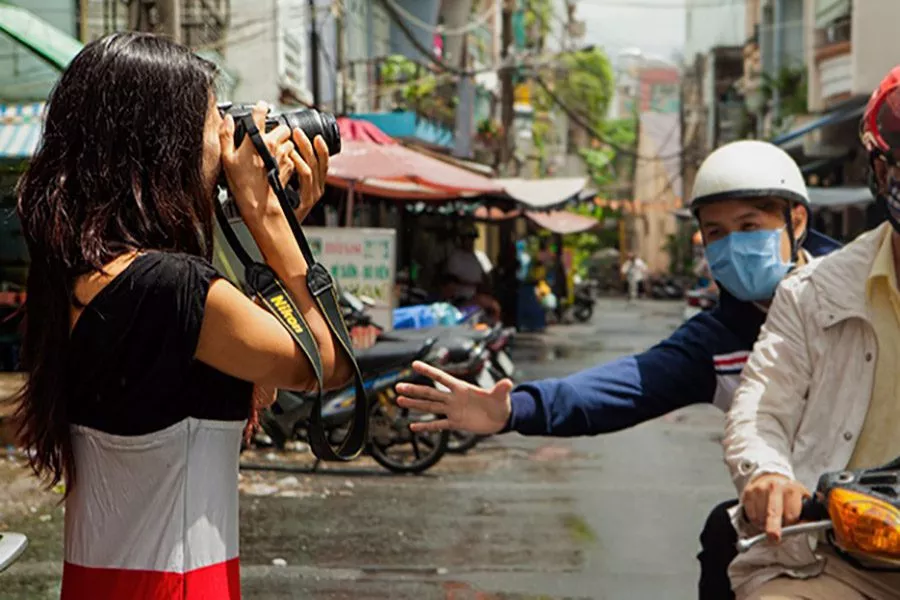
Understanding the financial aspects of your Vietnam adventure is essential for a smooth and enjoyable Vietnam motorbike adventure. By following our guide to money in Vietnam provided in this blog, you’ll be well-prepared to manage your money effectively and make the most of your experience.
Planning for Vietnam Motorbike Adventure?
Ready More >>>
Best time to ride motorbike in Vietnam: Tips and Advice
Road safety for riding in Vietnam 2024
Guide to North Vietnam by Motorbike: Weather, Routes and Tips
What to Expect: Vietnam Homestay in Motorbike Tours

